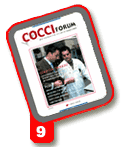Nutrition Notebook: IdeaChanging Paradigms in poultry nutrition and performance
The success of a broiler operation, particularly its profitability, is very dependent on how well the bird’s intestinal tract is functioning. Traditionally, intestinal health has been highly dependent on drugs, but today’s emphasis on raising birds with fewer drugs and the increased use of coccidiosis vaccination has changed the situation.
IDEA Program objectives
To help producers maximize nutrition and performance in broilers vaccinated with Paracox-5, Schering-Plough Animal Health Corporation has developed the IDEA Program.
I – Impulse.During the first 2 weeks of life, the goals are to prepare birds for immunity development, optimize development of the intestinal tract and immunity, provide nutrition that guarantees good development of bones and muscles, and take advantage of the high growth potential. D — Digestibility.During the third and fourth weeks of life, the goals are to maintain intestinal mucosa integrity, reduce exposure to harmful bacteria and guarantee good immune system function. E – Economic.This part of the IDEA Program is intended to capitalize on compensatory gain and reap the economic advantages that are possible as a result of strong immunity and maximum growth potential. A — Advance.
The IDEA Program helps poultry businesses operate more efficiently at time when resistance to
traditional anticoccidials has developed and there are limitations or bans on the use of in-feed growth-promoting antibiotics.
Trial 1This trial was initiated in partnership with the IRTA Research Institute, Spain, to assess the IDEA Program in Paracox- 5 vaccinated birds and traditional nutrition in anticoccidial-treated birds. Figure 2 shows the trial protocol. Figure 3 shows details of the diets provided to birds in the trial.
Trial 1 resultsThe results, shown in Figures 4, 5 and 6, demonstrate that vaccinated chickens that received a more digestible diet also designed to improve development of the intestinal tract and immune system during the first 4 weeks of life — the Impulse and Digestive phases of the IDEA Program — had the best growth and feed conversion compared to other groups in the trial. By the end of the trial, all groups had similar performance. The results may not be the same on farms with high density and sanitary and environmental challenges, but an improvement in performance should still be achieved from the Impulse/Digestive phase (0 to 28 days). Trial 2A second trial performed at IRTA in partnership with SPAH assessed the IDEA concept in birds grown to a younger age. Traditionally, coccidiosis vaccination has been considered unfeasible in birds grown to a younger age because they would not have as much time after development of immunity to attain maximum growth and feed efficiency. The Trial 2 protocol is shown in Figure 7 and the feed formulation and composition in Figure 8. Trial 2 resultsAs Figures 9 and 10 show, vaccinated chickens demonstrated better performance than drug-treated chickens until day 28 (the Impulse and Digestive phase of the IDEA Program). Final weight and performance in the trial were similar in all groups. Remember that vaccinated birds in the trial hadbetter performance during the initial period of growth. Trial 3A third trial assessed the effects of four rations with different combinations of nutritional concentrations during days 15 to 28. Its purpose was to determine if it is possible to have a compensatory response in the final phase of the feeding program. All chickens in the trial were vaccinated with Paracox-5. One of the rations included a highly digestible protein source. Traditionally, it has been thought that protein levels should be reduced to reduce exposure to harmful bacteria.
Trial 3 resultsThe details of Trial 3, which are available from Schering-Plough Animal Health, showed that reducing crude protein levels during the third and fourth weeks of life — the digestibility phase — has a negative impact on performance and that compensatory gain was not seen until 36 days. On the other hand, increasing crude protein levels during this time, since the ingredient has high digestibility, improves performance without increasing exposure to harmful bacteria. Increasing the digestibility of the protein fed was highly beneficial, even when the total protein fed was lower.
General conclusionsTrials have demonstrated that the IDEA Program helps develop and maintain the integrity of intestinal mucosa. The
IDEA approach promotes improved nutrition early in life and yields performance just as good as the performance
of unvaccinated birds receiving traditional anticoccidial treatment. IDEA can enable poultry producers to get the
most from Paracox-5 vaccinated birds.
|
Source: CocciForum Issue No.9, Schering-Plough Animal Health.















 © 2000 - 2021. Global Ag MediaNinguna parte de este sitio puede ser reproducida sin previa autorización.
© 2000 - 2021. Global Ag MediaNinguna parte de este sitio puede ser reproducida sin previa autorización.